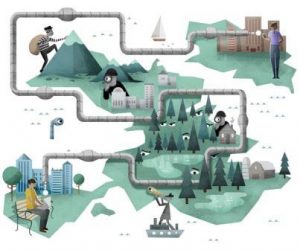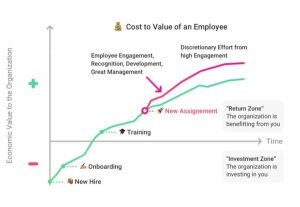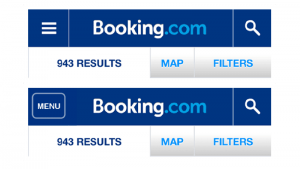I am a Silicon Valley veteran, and I’ve been around more blocks than I care to admit. I’ve spent the past 20-something years growing video start-ups. And now, I am the CEO of a venture-backed startup that helps businesses gather customer insights informing product development, UX design and go-to-market strategies. I am tired and excited at the same time – sort of like a parent of a smart kid who keeps me up all night long.
I honestly tried to avoid this title. I have been offered a CEO position more than once. I believe in the “Peter Principle,” and it took me several months to be convinced I should be CEO, not just COO or President at methinks.
Fancy new title aside, there are few things I believe in:
- Hard work (used to work in lumber mills);
- Family (I married up and have two great kids);
- Community (I was raised in Native American tribal traditions); and
- Giving back to young people (I have benefited from the mentorship of several amazing people).
I want to give-back and help the next generation of CEOs, so I am sharing a candid view on life as a first-time CEO.
Being a CEO is exactly what I imagined… and nothing at all.
I struggle a bit to describe what I’m experiencing. I’ve been in the valley a long time. I’ve had some wins and some losses. Not to be Rumsfeldian, but being a CEO is nothing like I imagined and exactly as I’d imagined. The job is way bigger than I anticipated for a couple of reasons. One, we’re a small venture-funded startup, so the CEO has to cover multiple areas. For me, right now, it’s literally three jobs in one. Second, in a small flat team, there’s as much coaching as I can handle — you know I love coaching, but there isn’t an hour in a given day where I’m not coaching someone up. And, I know from our shared experience, the emotional swings of startups can be intense. But, I didn’t understand the stamina I’d need to develop for this seat. I feel fatigued a lot.
These three things that surprised me the most.
There are three things I think I dismissed a little too casually before joining methinks as the CEO. First, the context-shifting in a given day is ridiculous. It’s exhausting. I don’t know if it’s the sleep deprivation or focus required to dive deep wherever decisions need to be made — and, at this stage, it’s nearly every single hour.
Second, I work for everyone. I knew this would be an adjustment, and I knew I would have to adopt a service-oriented mindset even more. But, what I didn’t understand is the delta between a collaborative mindset one needs as a VP and C-level versus the selflessness of a startup CEO gig — particularly the founder-friendly CEO position. I’m not in a situation where I’m replacing a founder or trying to kick-save a business on behalf of investors. This is a situation where the founders and I are friends, former colleagues, and I am trying to help them realize their dream. I’ve got to keep the founders happy, talk them through difficult decisions where outcomes are indefinite. I’m constantly framing for decisions — even the product and technology decisions I’m not necessarily going to make, I’m framing.
Third, the total lack of feedback is hard to interpret. As a CEO, there’s all kinds of power and social dynamics at play that inhibit CEOs from getting feedback. Looking back on my career, I understand why I have the love and appreciation of guys like Michael Cerda, Jon Niermann, Michael Bayer — I could give them feedback and talk through difficult decisions, discover outcomes and offer critical insights. They loved that someone was helping them get better. And, at other times, I struggled to work with first-time CEOs because they didn’t have the confidence in their own capabilities — they were caught up in perceptions of the position, struggled to get comfortable and let their guard down. For reasons I understand — Korean cultural reasons — it’s hard for many methinks employees to give me feedback, or “think out loud” in a meeting. The best thing that happens in the US office — the time I can get someone to engage in a healthy discussion, entertain arguments that are different from mine.
You need to manage the volume at work and at home.
At a personal level, it’s about volume — the volume of patience and empathy needed is immense. Bad things happen to good people. Just in the last three months, three really talented marketing team members have had to deal with serious personal issues. I’m talking about really serious things. It’s hard not to take on some additional anxiety when you care about those people. Plus, I have two teenagers at home, so I need to have patience and empathy for them too. As a result, when I discover that busted sprinkler head at 11 pm, I go all Clark Griswold in Christmas Vacation, you know, when he can’t figure out why the Christmas lights won’t come on. I’m the maniac spewing curse words in their front yard. That’s me sometimes. But, mostly, I’m too exhausted to “Clark.” Instead, I tend to pace around the house, muttering, turning off lights, locking doors, putting caps on tubes of toothpaste — my kids think I’ve totally lost my mind. But, yeah, I have to work on mustering patience, particularly when I’m low on sleep.
At a business level, it’s the usual stuff, figuring out marketing channels, pricing scrutiny, International expansion — being global is a challenge for the moment, first, the tariffs wreaked havoc in currency valuations, our bookings and revenues. Now, it’s Covid-19 — our main offices are in Mountain View (Santa Clara County) and Seoul, Korea. Two “hot spots”. Trade wars and Pandemics were two things I didn’t anticipate.
It’s very important to connect with the young people in the office.
I am the old guy and, for the very first time, I have to really try to connect with the 20-somethings. And, it’s really odd. There have been a number of cringy moments where age and perspective inhibit some basic, unimportant conversations in light-hearted social moments. Nothing offensive mind you, just, well, I’m old now — there’s no other way to say it. I’m learning to live way outside of my comfort zone. But, it’s pretty jarring for me. True or not, I felt like a cool older brother for the last ten years. I had more time to mentor and help younger people along. And, now, I’m the squinty guy the young people slow talk when replying to my questions. And, I can identify with their feelings. Thankfully, I don’t have much of an ego anymore. And, that slow talk doesn’t last long — my questions are still incisive and valuable.
The work you do the most isn’t necessarily the work you enjoy the most.
I spend an inordinate amount of time writing and editing. The founders of methinks aren’t native English speakers. My growth and rev-ops guy is French. My content marketing specialist is from Brazil. I’m editing everything right now. But, it feels good — I feel like I’m a brand manager, and I’m at home with that responsibility. I didn’t think I’d be okay with this, but it’s a regular tangible contribution, something that’s visible versus the other, more critical aspects of the job that are hidden from engineers, marketers, sales staff.
But, copy is not the thing I like doing the most. I love telling the origin story to investors, press, partners, big customers that need reassurances. Our origin story is damn near a fairytale. I can’t believe no one in the press has written it up yet. It’s a beautiful story, everyone that hears it connects with our founders and product.
Your company has managers, but you are the Head Coach.
I was a baseball catcher at Stanford, and I have pulled from that experience to form my leadership style. The catcher is so involved, calling all the defensive plays, directing traffic, coordinating with the bench. But, the demands are much more like the realities of CEO — catchers are communications hubs, they are communicating with everyone — keeping several streams of communications going on while performing. In any given inning, a catcher is telling pitchers where they’re missing, where their technique is off, and what the hitters are doing and expecting, and then there’s the conversation with infielders — telling them where to cheat ground defensively and what the pitching approach will be from frame-to-frame. And, then there are the coaches, who are analogous to a BOD — they’re watching what’s going on, but you have to deal with their anxiety, give them reality checks on their bias and convince them of what you’re seeing from behind home plate.
The humanity.
Like an average ballplayer, I borrow from nearly every great CEO I’ve worked for — I say nearly because there are a few CEOs I barely worked with, so I can’t really borrow from them. But, the CEOs who I worked for who were crazy or struggling with addiction, going through personal issues, etc., I still managed to learn something from those people. And, that’s really important too. Because, if you want to succeed as a leader, you have to really like people. I know that sounds trite. But, honestly, one of the worst CEOs I ever worked for was a guy that didn’t like people. I guess he was really smart and had a great CV, but he was startlingly honest about how much he disliked people and their flaws. If you don’t like people — if you can’t engage people, and have a hard time finding empathy for all kinds of people, well, don’t ever try to be a CEO. I know that sounds kind of obvious. But, I think this is the one thing many CEOs don’t think about before they take the gig — do I like people enough to get invested in the people of this company? That’s a hard question for candidates to ask themselves.
Don’t be afraid to take a risk.
I’m proud of what we are building over here at methinks. Some people thought I was crazy to lead a start-up that is taking on the multi-trillion R&D industry. But you know what, our story resonates with customers. One demo and they get it.
A version of this post originally appeared here as an interview with the author.
Business & Finance Articles on Business 2 Community
(55)




